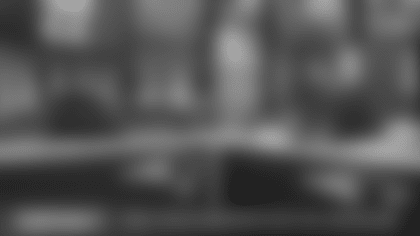[

]()
BB: I don't think we have any changes on the injury report from yesterday. What do you guys have going toady?
Q: Jarvis Green, what was your impression of him last week with his first start?
BB: Jarvis did a good job on a lot of things. Jarvis has really got a football background in terms of fundamentals. He's obviously been well coached and he's a hard working guy. He's come in here and really tried to apply himself and he's worked well with the older veteran players. Kind of like (Richard) Seymour did last year with Bobby (Hamilton), A.P. (Anthony Pleasant) and Willie (McGinest), guys like that, have really helped him and he's really taken that constructively. I thought he did a pretty decent job last week. It wasn't perfect, but he did some good things.
Q: Do you notice him picking up things from guys like Pleasant, Hamilton? Anything in particular?
BB: Absolutely. Pass rush techniques, hand placement in the running game, reading different blocks, you know, when an offensive tackle jumps out there and it looks like he is trying to hook block you and then if you play the hook block then they just take you and high arm you and throw you outside and create a monster hole inside. Little tricks like that, that offensive linemen use that the defensive linemen have to be able to counter the leverage and hand placement and all of that. He's a real conscientious kid and he's worked hard. I thought he handled himself okay last week against Miami.
Q: A lot of times with guys like him when the opportunities are so few that they have to kind of show up when they get them.
BB: Right.
Q: Is he a guy who has done that?
BB: Yeah, he really has. He showed up in preseason when he had an opportunity to play. Some of that came in the fourth quarter when you kind of look at it and say 'alright who is he really going against.' As we started to play him in more competitive situations he, I thought, competed well with the higher level of player all the way through the preseason. So, if he keeps working hard and he keeps doing what he's doing, then I think he can continue to improve. He's really got a chance to help us.
Q: In terms of where he went in the draft, he played two-gap in college so maybe he doesn't have the individual stats as some other defensive linemen would have and therefore maybe he slipped through the cracks?
BB: Yeah, maybe. We had him his junior year. He had good pass rush stats his junior year. I think he's a little bit, just in terms of the draft, undersized and he doesn't quite have the Willie McGinest type speed as an end. Probably some people saw him a little bit as an in between type of guy. He's a little too small for tackle, and not quite fast enough for end. As he really got enough technique and all of that to offset, maybe not the greatest physical measurements of some players coming out, but I think he's shown in eight or nine games now that he can do some of those things. Even though he's not as big as some people, he plays strong. He doesn't play weak, even for his size. Even though he doesn't time as the fastest guy in the world, he plays with good speed. You can see him making some plays in pursuit and chase. He shows a little poise and quickness on the quarterback. I think his overall performance has probably turned out a little bit better than his actual, maybe numbers, would indicate. And he was well coached in college obviously. Nick (Saban) is as good a defensive coach as I've ever been around. So, he had a good background coming in here and was able to build from a fairly high baseline.
Q: I want to ask you about the interior of the offensive line. You've had a lot of mixing and matching this year compared to last year where you could pick five guys and stick with them. Have you sort of gotten away from that this year?
BB: Well we'd like to have more of that than we have. Joe's (Andruzzi) missed some time. (Damien) Woody has missed a little bit of time, even though he has been out there and fought through it, missed some practice time. (He) missed the better part of the game in San Diego. So the deck, it has gotten shuffled a little bit, unfortunately. We would like to put the five best guys out there and let them work together and let them build that continuity. But if a guy is not on the field he can't be out there.
Q: Do you think you've hurt a little bit from a lack of continuity?
BB: You always like to have more. You definitely would like to have more. You would like to have the same five guys in there every week and every practice all through the season. Any time you don't have that, it's not as good as if you have it. But that's the way it is. We've had a lot of times in training camp where we went through a similar situation. Guys were able to get reps at different positions so at least when we are playing them now, we're not starting all over again. But it would be better if we could keep them all together, there's no doubt about that.
Q: How did (Grey) Ruegamer do last week?
BB: Well, he did okay. He hurt his leg a little bit there and was playing through it. It showed a lot of toughness to stay out there. But I think that probably affected his performance in a bit itself.
Q: I realize that he is not a star, but as a reserve, does hold up pretty well in the various positions that he has to back up?
BB: Yeah. I think Grey is a good football player. He's a good football player. It's unfortunate that he's a guy that hasn't always gotten a lot of opportunity and then sometimes when he has gotten an opportunity, for example last week, something happened to kind of take it away from him. I think he does a lot of things well. He's a strong physical guy. He is a smart guy, he makes very few mistakes on assignments. He is a pretty good pass blocker. But unfortunately we just aren't able to keep that one going this week either.
Q: The decision to play him at center and slide Woody out instead of using Adrian in his fifth week…
BB: Well, there is a number of things involved there. Some of which were that Woody had played guard and felt comfortable out there. You know, (David) Bowens is a pretty good tackle. We weren't sure how nimble Damien would be at center going chasing Zach (Thomas) all over the place which is what you would have to do at that spot. It was kind of a game time decision anyway as to whether Damien would really be able to go or not. We talked about it during the week, do we really want to make a game time decision and then know what we would be asking him to do in a game like Miami where we know where they are going to be and the center is going to have to chase Zach all over the place and would he really be able to do that effectively. So, that's part of it.
Q: Have you over the last few years, faced anyone as massive as Gilbert Brown?
BB: Yeah, he's a big one. He is. He's a big one. Anybody as big as Gilbert Brown? Well I think we've faced players similar. Who did we have?
Q: Ted Washington.
BB: Yeah, there you go. Ted Washington, yeah.
Q: What kind of problems does he present for you?
BB: Well I think Brown is deceptive. He's quicker and he runs better than maybe what people think he does. He's more than just a guy, like we said can just play in a phone in a phone booth, you know, can only play with two feet on either side of him. He's really more than that. He's got quickness and he can run and show some acceleration too. You know a lot of guys that are big, it just seems like they can never really get going and build any speed, but Brown has a little suddenness. You see him trying to beat the center's blocking and he's kind of tied up with him then… Boom! All of a sudden he makes a play off tackle. So he's very hard to run at, but he actually has, I think, better quickness and pursuit than what a lot of people give him credit for. And the same thing in the pass rush. He's made a couple of plays in the passing game because of his ability to get on the edge of a blocker, you know when the guy is in front of him, they can usually handle him. But when he gets on the edge, he's got enough power that he can kind of push through the blocker's shoulder and penetrate into the backfield. He's a good football player. A real good football player. I think they use him judiciously from the conditioning standpoint, so that they keep him fresh and he's not in there a lot on third down. Him combined with (Cletidus) Hunt, probably two of the better inside guys that we've seen. Both of those guys are really good football players and as a result it's hard to get to (Hardy) Nickerson because of Brown and Hunt. They are so disruptive and they make enough plays inside that if you spend too much time with them, then you end up turning Nickerson free and he makes plays.
Q: So it's kind of like Bowens and Zach Thomas?
BB: Exactly. A little different style, but it's similar. Nickerson is a little bit different than Zach and Brown and Hunt are a little bit different than Bowens. Whether it's (Larry) Chester this year, (Daryl) Gardener last year, there's similar type of problems. Hunt, I think, really is one of the best defensive lineman in the league. He's a very underrated guy. He never needs to come off the field. He's good against the run, he's good against the pass. He can run. He's got size, he's got quickness. He's a powerful player. He can really rock you in there and at the same time play with athleticism where you can see him jumping over guys and flattening down the line. Last year, they played him … they had some different injuries on the defensive line, but he played every position. They played him at crash end. They played him at the heavy end, the five technique. They played him on the nose in his natural position, which is really that three technique which is in that guard tackle gap. He's got enough athleticism, enough power, and enough quickness to really play all the spots along the defensive line and rush on third down. There are not a lot of guys in the league you can say that all about.
Q: A couple of days ago, you mentioned Darren Sharper is probably one of the most instinctive players in the league. In regards to pass coverage?
BB: Yes. I went down and saw him at William & Mary when he was coming out as a senior. In college he played corner and was a real good punt returner and he's returned punts in this league as well. So that's the kind of athlete that he is. He's not a traditional safety, you know some safties that are closer to being linebackers. This is a safety that was a college corner and a punt returner, so he's got real good hands. He's got real good ball skills and he's very instinctive in the passing game. Not that he won't come up and make tackles in the running game, I'm not saying that, because he does. He is just exceptional in the passing game. He reads the quarterbacks well. He really understands what the receivers are trying to do. If a receiver runs a crummy route, he'll jump it and he'll make the play. The interception he had against New Orleans was probably one of the best plays we have seen all year. He was actually responsible for the deep middle part of the field. They were playing man-to-man coverage and he was supposed to be in the deep middle and he intercepted a crossing pattern about six yards downfield and ran it down to the 10-yard line. I'm sure that (Aaron) Brooks thought he was in the middle of the field and that is where he was lined up and that's where he started. But he just read the play, and made the play really in the linebacker level. He's very instinctive in the passing game. As a quarterback you have to know where he is.
Q: When you have those two big guys inside, do you try to use other ways to try to get to the middle linebacker?
BB: Yeah. You have a number of alternatives but really in the end, probably none of them are very good. You can either bypass those two and go ahead and put a guy on the linebacker but then you might not get past the two linemen. You can double the linemen and hope that once you get a little bit of movement on him, then you can move up on the linebacker. That may or may not be any good because if you can't get any movement on him and you just turn the linebacker lose and sometimes you have the guard coming off the middle linebacker cuts in on the center or you have the center coming off and he scrapes over on the guard. So you get into some of those problems too where you get picked off, that's kind of what happens.
Q: Too hard to get to the tight end?
BB: Well you can get the tight ends and the tackles in there on him, but then you need somebody to block those people on the perimeter. So you are either trying to block them with wide receivers or kick them out with backs and then you end up with sometimes backs without blocking defensive ends and that kind of thing. It creates mismatches. You can definitely get the two inside guys and a middle linebacker. If you want to get them, you can get them. But then it really puts you in a compromising position at the point of attack somewhere else. It's hard when they're that strong and that big that you just can't get into them and move them back. If you can't move them off the line of scrimmage then even when you put two guys on them, you're just not getting any movement, so you've got a stalemate there and then usually a free guy standing behind him. It's just not where you want to be. So, sometimes you can misdirect them, try to get the linebackers going one way and give your blocking end the other way, you know, use some kind of influence play where you try to get the lineman to react to a block but you're actually trying to counter it and do something else. Stuff like that. In the end it just gets away from just basic football where you're going to win one-on-one here, you're going to win one-on-one here, the back is going to make five yards. You start losing two or three one-on-one battles along the offensive line and it's hard to make yards.
Q: With Kevin Faulk and J.R. Redmond, a lot of emphasis has been placed on whether or not Antowain (Smith) is getting enough touches generating enough yards. Do you skip down and say 'we're not getting a lot of touches with Kevin or J.R.'? The last two weeks it seems as if there's somebody right in his face right off the bat. Are you looking to get them some more touches?
BB: Well, you're right, there have been a couple times in the running game, a couple of set runs, where he just got hit two or three yards in the backfield. It's just terrible, it wouldn't make any difference who was getting the ball. It was just bad in the running game. It's tough, it's hard to go into the game and say, 'Antowain [Smith] is going to get the ball 20 times, J.R. [Redmond] is going to get it six, Kevin's [Faulk] going to get it five, Marc's [Edwards] going to get it three, Cam's [Cleeland] going to get . . .' you know, you just can't do it that way, what you do is you call plays that you think give you an attack against the defense, that you can keep them off balance in terms of running, passing, inside, outside, short, deep, misdirection plays, point of attack plays, and so forth. Then, you get to the end of the day and some things are going a little better than others and you shift here or you shift there, but you're really not sitting there and thinking, 'okay, J.R.'s only got two carries and he didn't do very well, lets give him three or four more plays.' It's just hard to have that kind of progression as a play caller, and I've been around Charlie [Weis] long enough to know that the only thing he cares about and the only thing I care about is moving the ball and getting it into the end zone. If that's Kenyatta Jones carrying it, I don't know if I really care, and I don't know if he really cares, but we're looking for production, so when you come to the sidelines and you talk in between series about it, 'okay, what do we need to do, what looks good, where should we attack and what adjustments have they made.' You're looking for players, you're looking for plays, and then you always think about your top players, the Troy Browns, Antowain Smiths, and the guys you know are going to handle the ball multiple times in the game, but beyond that, I think a lot of it depends on the flow of the game and the particular situations that you get into.
Q: The play calling must have to have a knack to say 'okay well this isn't working and we're going to move on from it' or 'this is about to work, even though it's like two, three, three! Has Charlie been good at that?
BB: Right, really, I think that's the real skill to it, is you can run a play and it can look bad, and you got to be able to say, 'well this should be a good play, and we just screwed it up, and if we run it again we'll get it right and we'll have a good play.' Or you look at it and say, 'well you know, we thought we were going to be able to get this, but we just don't really have it, here's the problem, we're not going to be able to fix the problem quick enough, we'd have to change too many things, or this is really not quite the way that we thought this was going to work out, and therefore we mind as well move on to something else.' It's just too much to get the play adjusted. Maybe it's a pass protection, whatever it is to get adjusted in the game, and that definitely happens. Sometimes you just calculate the way you think it's going to go, and then you actually get out there and start doing it and it just doesn't quite manifest itself the way you thought it would. You think of corners playing inside, and you know you can beat them on outside routes, and all of a sudden, yea, he's playing inside, but he's certainly jumping those outside routes, and they're just not there like maybe it looked like they were going to be there, or maybe they were there against somebody else, maybe they've changed that a little bit, maybe they told the guy, 'okay, we got beat on a lot of those outside routes these last couple weeks, we're going to play inside, but we're going to start jumping that outside.' Then you've got to counter with it, so that's the game within the game, so to speak.
Q: How did Troy Brown look yesterday?
BB: Better, better, he's looked better everyday, it's just a question of when he'll be at the point where he's ready to go. But, looking good at running around and being able to do things on a practice field is one thing, then being able to do it at this level, and in game competition, it's just a bit of a higher grade.
Q: Was he able to cut?
BB: Yeah, sure.
Q: Did (Daniel) Graham do anything?
BB: Dan's doing a little more. He certainly did more than he did last week. He was out there starting to move around a little bit, and he's getting a lot more strength in his arm, so, he's definitely heading in the right direction. He's young . . .
Q: Does he have a separated shoulder?
BB: No, I don't think so, he's got a sore arm.
Q: Is that why they were holding his arm?
BB: It was sore. It's not as sore as it was though.
Q: Could you just comment on facing a seasoned quarterback like Brett Favre? He's pretty much seen everything.
BB: He has. He's seen it all and he's seen it multiple times. He's seen it all five, six, seven years ago, even playing against him in the Super Bowl, in that game he had made a couple of audibles, changed a couple of plays, recognized, and hit us on big plays. I've got all the respect in the world for him. You're not going to get anything by him. It's not like you're going to come up with something he hasn't dealt with before. I think what it comes down to really is just being able to execute what you're doing well, you can't go out there and stop everything. It's not like he's going to go 0-30. He's going to hit them, but you have to try to manage the completions that he gets, and try to get him to throw where you want him to throw, make him hit his check downs, make him hit secondary receivers, make him hit guys that even if they get it, that they won't gain as much yardage where they want to attack you. That's what you try to do, but he's . . . it's hard though because if you want to strengthen one area then you're weaker in something else, if you want to strengthen over there, then you've got to lighten up another spot, and that's what he's really good at, is finding the soft spots in the defense, and being able to attack them. Of course, he's so accurate, of all the things he does well, we could talk about that all day, probably the best thing is his accuracy because he puts the ball right where only his guys can get it, and if his guy is running, which they usually are because they don't run a lot of stationary routes, or they don't just run out and just turn around and stand there, they'll always have guys on the move, and then he hits them right perfectly in stride, so that if you're not right there to make the tackle, then it's easy for them to gain another five, 10, 15 yards after the catch on a two- or -three yard pattern. That's really the difficulty of him, and like I said, he's not a guy that realistically you think you're going to go in there and just shut down. You just got to keep it under control.
Q: How has his game changed over the years? What has he gotten better on?
BB: Again, the comparison I would make would be like to take a guy like [John] Elway. Not running as much, not that he can't run because he still can run, and he's athletic, but just not as much as he ran earlier in his career, again similar to John, who was known for his scrambling earlier in his career, and later in his career, it's not that he didn't scramble, but was known for his passing accuracy and his leadership and his decision making and all that. To me, that's kind of the evolution of Brett's game. He's good at everything, he throws the ball now more than he runs it, he's looking to throw it more than he's looking to run it, and his passing accuracy and his decision making, and again, audibling, and all the little things, play action, looking off a guy, instead of looking off a safety maybe he looks off a linebacker to open up a crossing pattern coming from the other side of the field. Real subtle things like that, but, the guy really knows what he's doing, he can . . .
Q: When you are coaching Tom (Brady), have you ever showed him film of other quarterbacks like Favre?
BB: Sure, obviously we look at the quarterbacks every week because if we're playing Green Bay then we see the quarterbacks that have played against Green Bay, and we often talk about how [Peyton] Manning did this, or how Jim Miller did that, or how they got this play to work, and you know, sure we talk about that all the time. In meeting with the quarterbacks we regularly talk about specific plays, like if we're playing Green Bay it'll be Favre plays, or last week if we were playing Miami it would be [Jay] Fiedler plays, or if we're playing the Jets it'd be Vinny [Testaverde] plays, because obviously we're watching a lot of tape on those guys too, and if I see a play that looks like it's significant, either to what we're doing or a situation that we have been in, or it might be in because we run a similar type of play, how they handle it, we try to critique and coach off that, you bet.
Q: There are not many guys left like him, like Joe Montana, Dan Marino… Is he kind of a last breed of quarterbacks?
BB: Right, thank goodness. I don't know about that. I don't know.
Q: Is it more difficult to go up against a quarterback like Brett?
BB: He's pretty good, another thing that Favre has going for him that I think is similar to a Joe Montana for example, is he's been in the same system for 10, 11 years, however long it's been. Now I understand a couple of coaches have changed, but it's still the West Coast offense. It started with Mike [Holmgren] and Ray [Rhodes] was there, [Mike] Sherman was there, whoever was there, Andy Reid, and [John] Gruden and all those guys, he's had a lot of good coaches there, but he had been in that same system, similar to Montana, who was in that same system year after year after year after year, and you can't help but get a little more proficient in it, and if something isn't working, or you call a play and it doesn't quite hit the way you want it to hit, it's easy to go back and say, 'oh yea this is just like a problem we had a couple years ago when we played Seattle, here's what we did, okay, great let's go ahead and do it.' Then you have experience in doing it, you're not drawing it up in the sand saying, 'aww geez, that might work,' you know from previous experience that when they do this, that when the linebacker starts overplaying the pick pattern to get in the back of the flat, then we run them back inside on a quick angle route, and here's the way we called it, whatever it was, and I think you see a lot of elements of Green Bay and their offensive system in that. It's a real subtle change, and maybe everybody's doing the same thing, but one guy runs this pattern a little bit different, or they do the same pattern but maybe change the play action a little bit to effect the linebackers differently, stuff like that, and I think that contributes to a lot of his successes, his familiarity with the system and his execution of the system because physically he's got all the talent in the world, but within the system he also has the ability to execute virtually everything they ask him to do, there's no throws that you look at him and say, 'boy he's having trouble with that one,' he really makes it all look easy. I mean, that play he makes against, who was it, I don't know, he's throwing a screen pass, and the tackle drops out and takes the screen away, so he's kind of in trouble there, he can't throw the screen, he gives a little bit of ground to get away from the defenders that are coming in, steps back, and hits [Donald] Driver and throws it about 70 yards in the air down there to Driver, I mean, a guy's looking at the screen and you wouldn't even think he would see a receiver who's just clearing out a defense.
Q: They called that back didn't they?
BB: The guy was down field on a screen, but I mean it still was a heck of a play, a) to even see it, and b) with the screen and the guys rushing to get away from them, and then to launch it three quarters of the way down the field. Just stuff like that.
Q: Does he throw the ball as hard as you've ever seen?
BB: There are some guys that can throw the ball, Bert Jones, Terry Bradshaw, I mean those guys, they could put it part way through this wall, maybe Brett could too, I don't know, but he's got, there's no question about his arm strength, I've seen Michael Bishop throw the ball as hard as anybody, sure he can throw the ball 90 yards. It's not about arm strength, to me that's way overrated, there are a lot of guys in this league that probably struggle to throw the ball 50 yards without being able to step into it, you know, the punt, pass, and kick type throws, where they can really launch it, I mean just stand there under pressure with guys on them and just fling it, there are a lot of guys that can't do that, they're good quarterbacks because of their decision making and their accuracy and their quick judgment, and all that, that's what makes them good.
Q: On that screen play, would you tell Tom to throw it away?
BB: Well, here's what I tell the quarterbacks: any time that a play breaks down, that's the most difficult play for you in the game, when the guy jumps out and covers the screen, when the receiver runs the wrong pattern and then you're standing there holding it, when you drop the snap from center, when they snap it over your head, when the guy comes clean right up the middle on pass protection and he should have been blocked and he wasn't blocked then you've got a split second there to make a decision, that's the most critical time in a game for you, and what you do with that decision, we're all waiting to see, and our fate hangs in the balance because you have the ball, and it's not good, and at that point you've got to try to cut your losses. Now, every once and a while on that play you can cut your losses and turn it into a positive play, but most of the time, those kind of plays, what you want to try and do is minimize the damage that could be done, a) don't turn the ball over, b) lose as little yardage as possible, c) if you can get anything positive out of it great, but lets try to cut our losses at that point. Whether it was the play in the Kansas City game that got snapped over his head, those are the kind of plays where a quarterback's got to make the best of a bad situation, you turn around to hand the ball off to the back and he's gone the wrong way, you're standing there with the ball with no blocking and nothing to do, you know, what are your options right there? Try to reach and stretch it, and hand it to him and fumble it, and you probably wouldn't have gained anything anyway, or turn around and get what you can. Or bootleg it, but whatever that decision is, it needs to be made with the idea of minimizing the damage that could be done to the team. So with a screen pass, those all come under the same category. Good luck. Okay thanks.


































